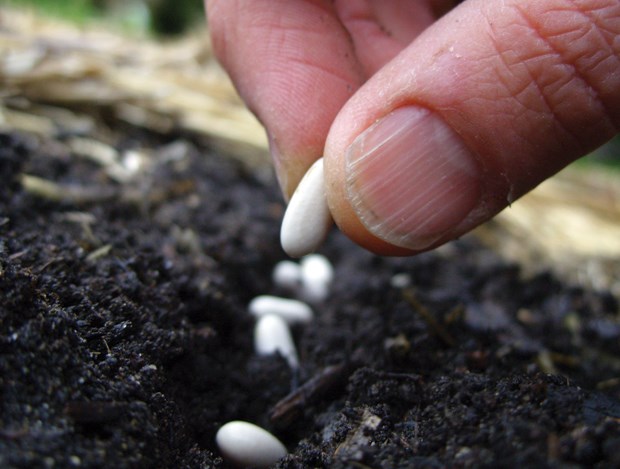I've been admiring the flowering red currants in bloom along my daily dogwalking route.
They mark the return of the Rufous hummingbird - one of my favourite garden visitors. Plants like the flowering red currant bring diversity, native pollinators and other beneficial insects into our gardens. To learn more about what we can do to support our pollinators, attend the upcoming GardenSmart workshop on Planting a Native Habitat Garden on April 23 at 1 p.m. at the Lynn Canyon Ecology Centre (to register, search for GardenSmart at eventbrite.ca).
The return of the Rufous hummingbird also coincides with the historical last frost date for Vancouver (March 28). Unfortunately for the folks living above the Upper Levels Highway, you may need to wait until the end of the month to declare your garden a frost-free zone.
Moving into April with warmer soils and weather, we can direct-seed more vegetables into the garden. Try getting your favourite salad greens, peas and a batch of root crops into the ground this month (carrots, beets, radishes and turnips will do well).
Speaking of radishes, cool wet spring weather will give your radishes a mild flavour, perfect for enjoying with butter and a pinch of sea salt on warm bread. If you leave your radishes in the ground too long (anything over five weeks is questionable but it depends on the variety) they will get hollow and woody on the inside, and will not be as tasty.
I love the long, white-tipped French Breakfast variety, but the Pink Beauty will entirely resist becoming woody and is easier to grow.
The frequent showers in April will keep your soil moist, which is great for slow-togerminate crops like carrots. Many new gardeners find it very difficult to grow carrots, and this is often due to the seed bed drying out before the seeds germinate. Carrots are finicky and must have a consistently moist seed bed while they germinate. Hopefully April showers will help solve this problem in your garden.
If you started tomato seeds indoors in February, now is probably a good time to "pot them up" into a larger pot. A good indicator that it is time to pot up is when your tomato seedlings have developed three to four branches or are at least seven centimetres tall. I like to put tomatoes in one gallon pots because this gives their roots lots of room to grow. When you look closely at your tomato seedlings you will notice tiny hairs on the stem. Each of these hairs has the potential to become a root if they are in contact with soil. When I pot up my tomato seedlings I always bury the plant so only the top leaf pair, and approximately one centimetre of stem, is above soil level. It takes about two weeks before it is obvious that the seedling is still growing because it is busy producing roots out of sight. More roots equals a happier and healthier tomato when planted into the garden because it can soak up more water and nutrients to produce delicious tomatoes.
If you're still nervous about starting your vegetables from seed or just did not have time to get to it this spring, the Lynn Valley Garden Club is hosting their annual Plant Sale on Saturday, May 7 from 10 a.m. to 1 p.m. at St. Clement's Anglican Church, 3400 Institute Rd., in North Vancouver. The Plant Sale raises funds for local garden projects, and Catharine Winstanley, Lynn Valley Garden Club member-at-large, shares that, "the plant sale is a great way for our club to give back to the community, and share our love of gardening.
The money we make goes to all kinds of local community gardening-related projects, from local seed libraries that enable people to try growing their own vegetables, to supporting gardening initiatives at hospices and care centres."
At the plant sale you will be able to buy vegetable and herb seedlings, perennials and shrubs for shade, sun, and drought tolerance, and access the minds of Master Gardeners available to answer your toughest gardening questions. Admission is free, but bring cash for your purchases.
Happy gardening!
Emily Jubenvill grew up on the North Shore and is passionate about growing fresh organic food. When she's not in the garden you'll find her on a mountain or by the sea. She's the manager of the North Shore Neighbourhood House's Edible Garden Project, and you can reach her at [email protected] or ediblegardenproject.com.



